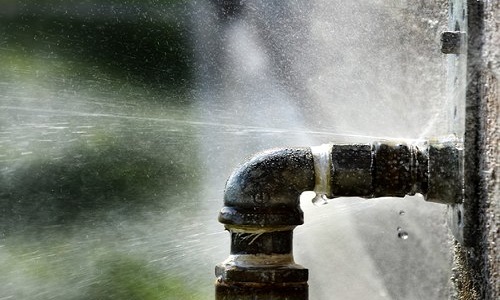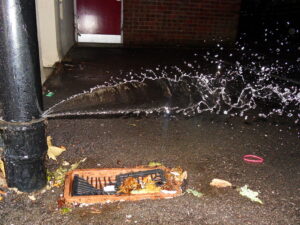They are making several great observations on the subject of The Do’s And Don’ts After Water Damage as a whole in this post further down.

What should you do if a pipes bursts in your house? Do you desire a mini-waterfall and flooding in an area of your home? You have to act quickly if you find yourself in this scenario. The longer you wait, the a lot more serious the damages that can take place to your residential or commercial property. The presence of mind is key in these events. For these reasons, you need to discover just how to act in case of a ruptured pipes. Check out the adhering to tips listed below to aid you act quickly since time is important.
Shut Off the Main Waterline Shutoff
Look for the regional shut-off valve to transform off the water in one certain area just. If you do not know where the local shut-off shutoff is, go for the main water line shutoff as well as turn it off. Generally, the primary valve is located outside the house next to the water meter.
Call Water Damages Remediation Pros for Help
After closing the water source, call the professionals for assistance. This situation is not something you can do some do it yourself since the pipes required to be repaired and also there is a requirement to address the various other damages to your building. Look for aid from a respectable company providing 24/7 emergency solutions if you can not cope. With their specialist help, you can avoid a lot larger water damages consisting of warped walls, loosened floor tiles, or damaged frameworks. Do not take this problem lightly and also look for professional assistance for your total peace of mind as well as a credible solution.
Record the Damage For Insurance coverage
While you're waiting for the pros to show up, obtain some documents of the damage triggered by the wayward pipeline. Take pictures as well as video clips of everything. Do close-up shots of the damaged valuables as well as areas. Your documents will function as proof for your property owner's insurance coverage. Maintaining aggressive with this situation helps you to file a claim for coverage, which will additionally sustain you and also your family members to get back on your feet.
Salvage Things That Can Be Saved
Once you're done taking pictures, analyze the damaged things and also obtain one of the most vital ones from the pile. Dry them off in a dry/warm location far from the broken area as well as try to preserve them as much as you can. Drag as much moisture as you can to the product so it can start to dry.
Beginning the Drying Refine
The good news is, the water from your waterlines is currently clean so you do not have to worry concerning drain water. The moving water may have disturbed the dirt and particles in your floorboards and carpetings. Blot out as much water as you can from the surfaces with old towels.
Specialists are the only people certified to assess appropriately and deal with the burs pipes and also subsequent damages. As always, pipes do not just instantly burst out of heaven. They usually provide silent red flags like gurgling paint, water stains. Unusual noises in the plumbing, caving ceiling, mildewy odor, or peeling off wallpaper. Keep in mind of these indicators and do some safety nets so you can nip any problems in the bud.
What should you do if a water pipe bursts in your home? For these reasons, you require to learn exactly how to act in the occasion of a burst water pipeline. After closing the water source, call the experts for help. With their professional help, you can avoid a lot larger water damage consisting of deformed baseboards, loosened tiles, or harmed frameworks. Luckily, the water from your waterlines is already tidy so you don't have to stress regarding drain water.
How to Handle a Burst Pipe and Minimize Damage
Steps to Take Ahead of Time
If you own property in an area that experiences cold weather, you need to be aware of seasonal maintenance tasks that will help you protect your property as the weather changes each year. One of the most important steps is to winterize your pipes to ensure they won't freeze or burst when the temperature drops. This includes action items like insulating any exposed pipes, detaching garden hoses and covering outdoor faucets. If the weather gets cold enough, you may even consider leaving a faucet dripping or opening cabinet doors during the coldest parts of the day.
No matter how prepared you might be, accidents and emergencies still happen. You'd be wise to set up a savings account specifically for your property so you have a "rainy day" fund set aside for unexpected expenses. All homes—regardless of age, location or condition—will inevitably need some form of emergency repair.
Steps to Take for Frozen Pipes
A frozen pipe will not necessarily burst, so if you can catch a frozen pipe early on, you could save yourself a major headache. When your area experiences frigid temperatures, be sure to check your plumbing and keep an eye out for warning signs like faucets only releasing small amounts of water or toilets not refilling when flushed. If you do run into one of these issues, you're likely dealing with a frozen pipe.
If this happens, your first step should be to cut off the water supply to that section of the plumbing. Expanding and freezing water can quickly cause damage. Even if the water supply is shut off, you will likely still deal with some leaking from the water that defrosts after the pipe has thawed. Be prepared with a mop, bucket and/or towels to quickly soak up any excess water.
In order to thaw a frozen pipe, you can use a space heater, infrared or incandescent heat lamp, or even a hairdryer to warm up the frozen area. Heat tape is also an option and should be used according to manufacturer instructions. Do not use any sort of open flame to thaw frozen pipes, as it poses a major fire hazard and can damage your pipes further.
Steps to Take for a Burst Pipe
Water damage claims are the second most common insurance claim in the U.S. When you're dealing with a frozen pipe, the water continues to expand as it freezes, which creates pressure that can cause a pipe to burst. When this happens, the crack or leak in the pipe allows water flow from the pipe to enter your home where it shouldn't. If a pipe does burst, you need to act quickly to mitigate property damage and repair cost.
Your very first step should be to shut off your main water supply to minimize flooding—typically the most expensive damage to address. Once you've shut off the water supply, make sure you identify the entire area that has been impacted by the leak. Remove as much water as possible—as quickly as possible—using a mop, sponges, towels or a shop vacuum or wet/dry vacuum. To prevent long-term damage due to moisture build-up, run a dehumidifier or fan in the affected area. Contact a licensed plumber to ensure the pipe is correctly repaired before running any water to that section of the home again. Burst pipes and the associated water damage are something you absolutely want to avoid as a property owner. If you've had to learn your lesson the hard way, don't let yourself get caught in a similar situation during the next spell of cold weather. The best way to deal with frozen or burst pipes is to prevent them in the first place—proactive winter maintenance will save you time, money and a whole lot of stress.

Do you really like reading about Water Damage: Tips On What To Do When Your House Is Flooded? Write feedback further down. We'd be pleased to see your responses about this blog. Hoping that you come back again in the future. If you please take the opportunity to share this content if you appreciated it. We appreciate reading our article about Do’s And Don’ts In Case Of Water Damage.